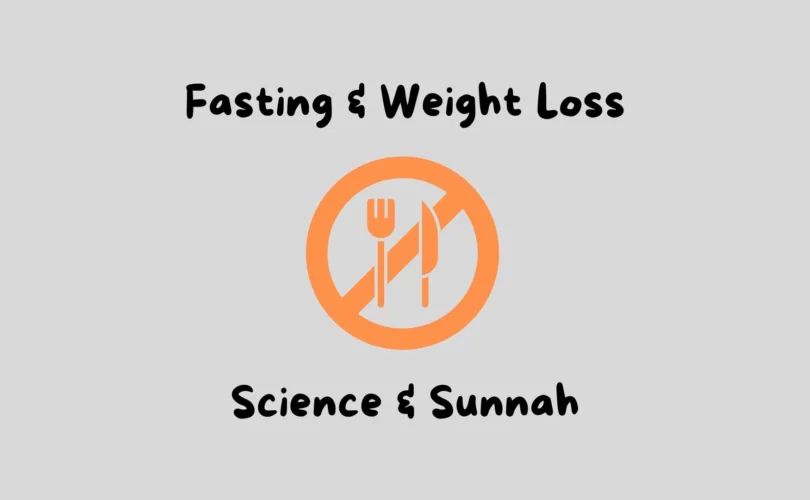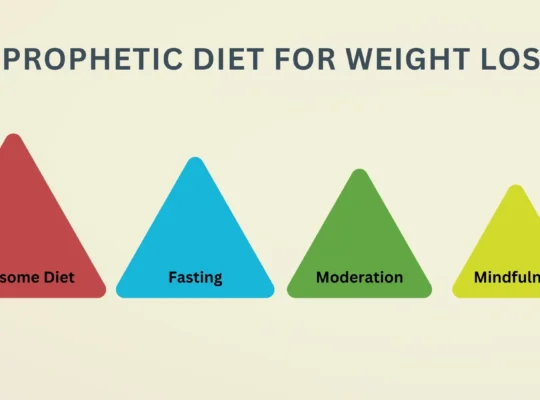How Fasting Helps with Weight Loss
Fasting has been practiced for centuries for both spiritual and health reasons. In Islam, fasting is not just an act of worship but also a means to purify the body and soul. Recent scientific studies have confirmed that fasting can play a significant role in weight loss, improving metabolism, and overall health. This article explores how fasting helps with weight loss from both a scientific and Sunnah perspective.

1. Understanding Fasting in Islam and Science
Fasting in Islam (Sawm)
In Islam, fasting (Sawm) is an obligation for Muslims during the month of Ramadan and is also recommended as voluntary fasts, such as on Mondays and Thursdays. During fasting, Muslims abstain from food, drink, and other physical needs from dawn until sunset.
Scientific Perspective of Fasting
From a scientific standpoint, fasting refers to a period of voluntary food restriction, which can range from intermittent fasting (IF) to extended fasting periods. Research has shown that fasting has numerous health benefits, including weight loss, improved metabolism, and enhanced brain function.
2. The Science Behind Weight Loss Through Fasting
a) Caloric Restriction and Fat Burning
Fasting naturally reduces calorie intake, leading to a caloric deficit, which is necessary for weight loss. When the body is deprived of food for a prolonged period, it starts using stored fat for energy, resulting in fat loss.
b) Insulin Levels and Fat Storage
Insulin is the hormone responsible for regulating blood sugar levels. When we eat frequently, insulin levels remain elevated, preventing fat burning. Fasting lowers insulin levels, allowing the body to tap into fat stores for energy. This is why fasting is particularly effective for reducing stubborn belly fat.
c) Autophagy and Cellular Cleansing
Autophagy is a process where the body removes damaged cells and regenerates new, healthy ones. Fasting triggers autophagy, improving metabolic function and aiding in weight loss by enhancing cellular repair and reducing inflammation.
d) Growth Hormone and Muscle Preservation
Fasting significantly increases human growth hormone (HGH), which helps in fat loss while preserving muscle mass. Unlike traditional dieting, which often leads to muscle loss along with fat loss, fasting helps retain lean body mass.
3. The Sunnah of Fasting and Its Impact on Weight Loss
a) Fasting on Mondays and Thursdays
The Prophet Muhammad (ﷺ) encouraged fasting on Mondays and Thursdays. This Sunnah practice aligns with modern intermittent fasting (IF), which has been scientifically proven to aid in weight loss, boost metabolism, and improve insulin sensitivity.
b) The Prophet’s Eating Habits
The Prophet (ﷺ) emphasized moderation in eating. He said:
“The son of Adam does not fill any vessel worse than his stomach. It is sufficient for the son of Adam to eat a few mouthfuls to keep him alive. If he must fill it, then one third for food, one third for drink, and one third for air.” (Sunan Ibn Majah 3349)
This hadith promotes mindful eating, preventing overeating, and encourages portion control, which are essential for effective weight management.
c) Delaying Suhoor and Hastening Iftar
The Prophet (ﷺ) recommended delaying Suhoor (pre-dawn meal) and hastening Iftar (breaking the fast). This practice ensures a structured eating window, preventing unnecessary snacking and overconsumption of calories.
4. Different Types of Fasting for Weight Loss
a) Intermittent Fasting (IF)
Intermittent fasting follows a cycle of eating and fasting periods. The most common methods include:
- 16:8 Method: Fasting for 16 hours and eating within an 8-hour window.
- 5:2 Method: Eating normally for five days and reducing calorie intake on two non-consecutive days.
- Alternate-Day Fasting: Fasting every other day or consuming minimal calories.
b) Extended Fasting
This involves fasting for 24 hours or more and is known to promote deeper autophagy, fat loss, and metabolic health benefits.
5. Practical Tips for Effective Weight Loss Through Fasting
a) Eat Nutrient-Dense Foods
- Include Sunnah foods like dates, honey, barley, and olives.
- Prioritize protein-rich foods to preserve muscle mass.
- Consume fiber-rich foods to stay full longer.
b) Hydration is Key
- Drink plenty of water between Iftar and Suhoor to prevent dehydration.
- Avoid sugary drinks and excessive caffeine, as they can lead to energy crashes.
c) Avoid Overeating During Iftar
- Start with dates and water, followed by light meals.
- Avoid fried and processed foods that can cause weight gain.
d) Incorporate Physical Activity
- Engage in light exercise like walking before Iftar.
- Strength training helps preserve muscle and boost metabolism.
6. Common Misconceptions About Fasting and Weight Loss
a) “Fasting Slows Down Metabolism”
Research has shown that short-term fasting actually boosts metabolism by increasing norepinephrine levels, which help in fat burning.
b) “Skipping Suhoor Leads to More Weight Loss”
Skipping Suhoor can lead to muscle loss, low energy levels, and overeating during Iftar. A balanced Suhoor meal ensures sustained energy levels.
c) “Fasting Causes Nutrient Deficiency”
Proper meal planning ensures all essential nutrients are consumed, making fasting a sustainable and healthy approach to weight loss.
7. Final Thoughts: How Fasting Helps with Weight Loss
Fasting, as prescribed in Islam, is not just an act of devotion but a scientifically proven method for weight loss and overall health improvement. By following the Sunnah of fasting and maintaining a balanced diet, one can effectively lose weight, improve metabolic health, and enhance spiritual well-being. The combination of scientific evidence and prophetic guidance makes fasting an excellent tool for achieving optimal health while strengthening faith.
If you’re looking to incorporate fasting into your weight loss journey, start with small steps, follow the Sunnah, and be consistent. Remember, moderation is key, and adopting a healthy lifestyle along with fasting will yield long-term benefits for both body and soul.
Read: How Daily Salah (Prayer) Promotes Mental Peace and Stability
Disclaimer: The information provided in this article is for educational purposes only and is not intended as a substitute for professional medical advice. Always consult with a healthcare professional before making any changes to your diet or fasting routine.







